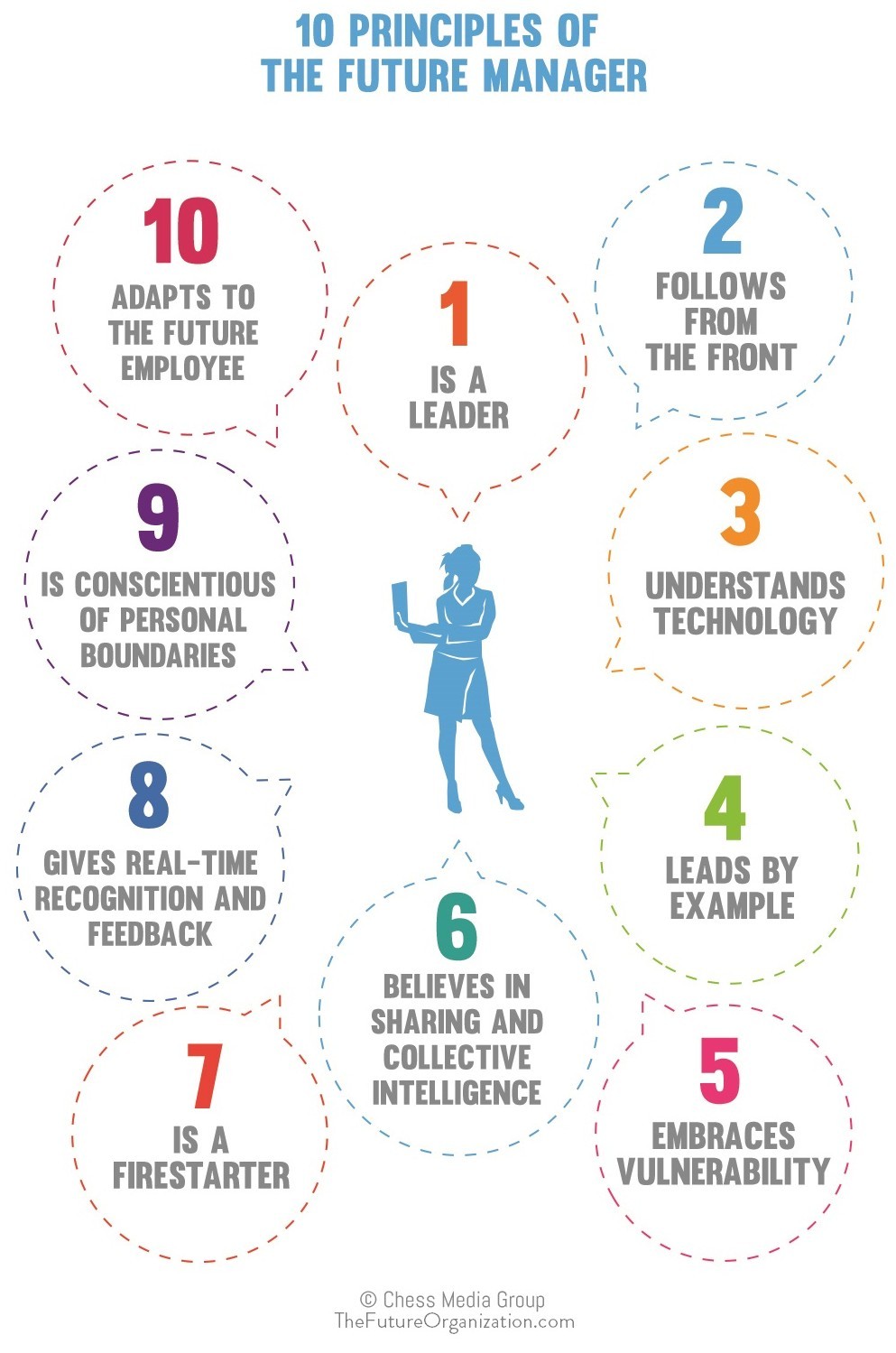Positioning yourself for leadership

I'm a bit late posting this but a few of you have asked for it 😊
Back in October, 2016 Young Women in Energy organized a panel discussion based on Jacob Morgan’s “Evolution of a Manager” and “10 Principles of a Future Manager”. I was one of three panelists alongside Joanna Desjardins (Conoco Phillips) and Bobbi-Lynn Werbowesky (TransCanada). It was my first time speaking to such a large audience and was thrilled to hear from so many people after the event.
Thank you so much to Young Women in Energy for the chance to share my views!
Which principle of the ‘Future Manager’ has been the most significant to you personally in moving your teams forward and why?
I have very strong beliefs about sharing and collective intelligence. I learned early in my career that a very frustrating and counterproductive behavior is when a manager doles out information like they’re making a trail of breadcrumbs. It’s a scarcity mentality that keeps people in this pattern of behavior—they believe that if their direct reports know as much as they know, then there’s a chance someone will oust them from their position. Scarcity mentality causes people to cling to recognition and accolades as well—not just information.
I think one of the earliest conversations I had with my small team when I started was about, when they would be interested in my role. If I’m not preparing people to be in my seat, and giving them all the information available to make good decisions, then I’m going to have a serious deficit in future talent. My approach might stem from something deeper than just the experiences I’ve had in business. We were raised with an abundance, rather than a scarcity mindset, the zero-sum paradigm of life. Abundance mindset is very similar to the collective intelligence principle in the view that there is plenty out there for everyone. So, to move my teams forward, I direct the focus to the long term. For example, initiating conversations about ways in which the sales teams can provide each other introductions and meetings to parallel clients, which is quite opposite to the way in which most BD or sales teams hoard info.
Some of the best leaders I know are people who are extremely generous with not only information but time—they are making an investment through their extra effort in being available and open. Gosh, this is a hard one when you’re busy, but it really can’t be understated. I’m still working on this, trying to get better at it.
What do you believe is the most beneficial trait a younger manager brings to the leadership table?
A young manager with a “growth mindset” is a powerful thing. I think the framework labels this as “being a fire starter”—sparking ideas, challenging convention and experimenting. Carol Dweck is an expert on growth mindset studies. She talks about how brains and talent are just the starting point, whereas a growth mindset demonstrates a love of learning and a resilience that is essential for great accomplishment. Virtually all great people have these qualities.
A young person who wants to know more and to interact outside of the direct requirements of their role is attractive, in my opinion. The power in this is that it is honest and refreshing. One of my mentors mentioned some of the young engineers working for him, and how they would come in and question everything, push the senior executives to stretch and move, and ultimately they did make improvements inside an already high-functioning organization. Of course, my mentor laughs and rolls his eyes at his initial annoyance about these “pushy millennials”, but ultimately he is proud of them and likes what they’re doing. So here it is important to note that the vulnerability that comes with being hungry for answers is not a negative thing—no one expects you to show up having all the answers. And craving to know how all the pieces outside of their position fit, is a very strong trait that I would look for. Approaching work as though you have “been there, done that,” would be an example of a career-limiting behaviour—you will lose growth opportunities because you don’t believe in the challenge.
What have you found to be the best method for emerging leaders to develop better leadership skills? (i.e. volunteering, career coach, mentorship, education, training, etc.)
I am a big proponent for both mentors and career coaches. Coaches are professional consultants who may specialize in questioning for exploration, goal-setting and providing feedback for development, or a combination of those. Mentors have brought a substantial amount of value to me, but it was my coach that provided the largest amount of input during the time I transitioned from “individual contributor” to manager. It was a hard transition. I was hired and expected to just know how to build the business and manage the people. After being an army of one, there were all of a sudden many different kinds of people who were motivated by entirely different things from one another. So I did some research online and found Barbara Morris of Elevate Coaching.
I spent an entire year Skyping with Barbara every Monday at 7am. It started with foundational knowledge first—analyzing the aspects of my personality, discussing my workload management, brainstorming business development tools and forming unique communication strategies for each “player” in my work world. Then, I honed my discipline in managing my personal time. I was completely immersed in my role to the point I had no life. So Barbara helped me understand that I needed a “brand” outside of my work world. That branding exercise resulted in the creation of this blog—I needed an outlet and a platform.
Unlike the feeling that you may get from divulging a gap in your skill set to your boss, you can revel in the feeling of having a true confidant—an unbiased source of constructive criticism who does not also sign your paycheques. has helped me through some challenging management issues and has shown me how to better apply my strengths.
Considering the foundational duties of a manager, what has been the most difficult [to master]? (i.e. hiring, firing, difficult conversations, performance reviews, etc.)
I immediately struggled with hiring. I still do. I tend to believe someone when they say they’re going to be able to provide a certain level of skill and expertise. I think a lot of that came from being my own boss and just inherently knowing what I needed to be doing rather than waiting for direction. Layer on top of that my own personal dislike of micromanaging, and I ended up hiring people who were incredibly good at talking. When I proceeded to turned them loose to go and perform all those wonderful things they said they could do, well, ouch.
I then had to quickly learn how to fire people—legally, respectfully, and safely. I realize my blind spot was not taking the time to figure out the exact traits that would be required of an employee in each role and searching for those traits and qualifications. Instead I was drawn to energy and personality. I’ve read that this is a common shortfall of millennial managers—is that their entrance into management is typically following an “individual contributor” path, so these blind spots with hiring come from being more drawn to hiring people for likeability and personality rather than skillset because they don’t yet know what those skills look like. Young managers might also share my desire of not wanting to be seen as “micro-managing”. I never wanted to stifle their ideas by being so controlling that they didn’t have an opportunity to learn, experiment and make the occasional mistake. Finding that balance between being imposing and providing too much freedom was a painful, stressful process.
Younger generations, like millennials, often consider themselves to be more inclusive in their leadership styles. Have you noticed if you’ve tailored your leadership style when your direct report is, for example, a male or female? Or perhaps more introverted than extroverted? What considerations have you made?
I think I have tailored my approach more based on seniority. This is a hard one for me because my entire team is older than me, they span three different generations and have very different backgrounds. I’ve learned to read between the lines and understand when it’s okay to send messages on the weekends or beyond work hours, and when it’s going to be counterproductive or create a conflict. Some of my employees are comforted by boundaries and hierarchy, and others are free spirits. So yes, I do tailor the conversations. I know when I need to dial down the formality and when I should be incredibly direct. Most of all, I’ve started to understand what makes each team member feel safe, and I try and tailor my leadership with this as the focus. I don’t think people can do good work unless they feel safe to speak their mind, make mistakes.
How can a younger leader capitalize or dispel a myth about a gender, personality style, or stereotype?
I’ve written about this on my blog, and I think the quality that young leaders would most benefit from is forgiveness. The world is not going to change instantaneously. There are going to be moments where a female working in a male-dominated industry will witness appalling behavior. Being patient and forgiving is a good way to set the stage for later improvement. Here’s an example, I showed up for work on my first day at a concrete placing and finishing job. I was quite nervous but I had always been strong physically and worked hard so I wanted the $18/hour job (good money at that time) while I was in University. The foreman looked me up and down, cigarette hanging out of him mouth, and went “You have to be f-ing kidding me”. And just walked away. I was pretty much an instant puddle at this moment, I was 19 years old, I didn’t have much to say in return so I just went to work. During that summer I became his right hand woman, he relied on me to organize the work for the day, help get things organized and we actually became quite close with one another. I am sure that in those three months I made him re-evaluate how he thought about young women working in that position. Here’s the thing about forgiveness that I’m trying to get at… had I quit after that initial introduction I wouldn’t have had the chance to change those gender stereotypes. Leading through example is really the only way to dispel myths, and the first step is to be forgiving so that you can move to step two—correcting the stereotype.
Sheryl Sandberg is quoted in her book ‘Lean In’ saying “In the future, there will be no female leaders. There will just be leaders”. What single piece of advice would you give to any millennial positioning themselves for a leadership position?
I just love that quote. My advice is that you need to mentally prep yourself to understand that it’s not a fair and balanced system just yet. Nor was it a fair and balanced system fifty years ago when women really took their first strides into the workplace. You need to picture yourself as being a pivotal part of the transformation that’s taking place. You need to choose to participate—it becomes tempting sometimes to reach for comfort rather than growth. I am incredibly fortunate to have been raised by two generations of women who just grinned and beared those moments, broke down every now and then in the privacy of their cars or homes, and then dug their heels in and pushed forward to accomplish incredible things. So it’s a choice. If you want leadership roles, you need to create a mindset of growth and resilience and that’s how we are going to get to be “just leaders”.
